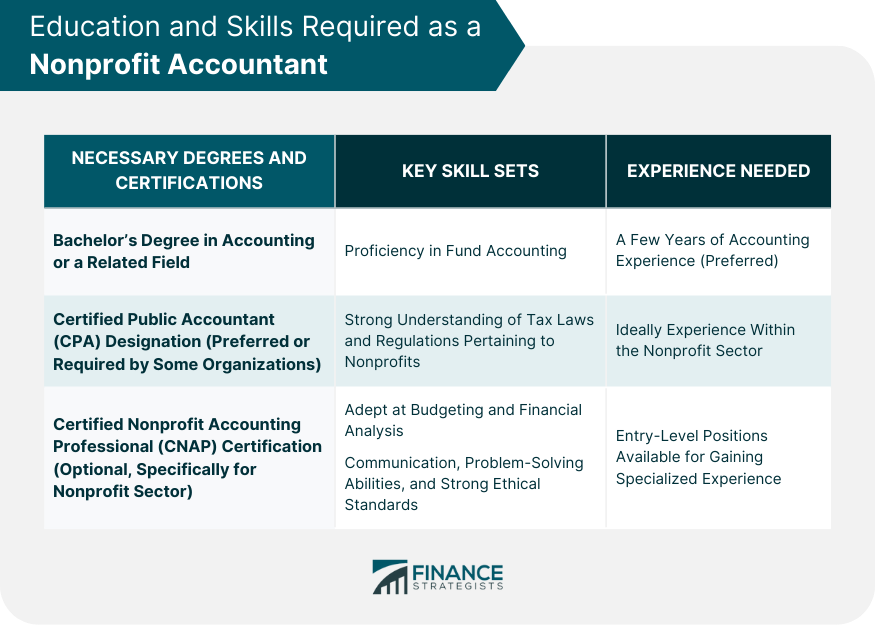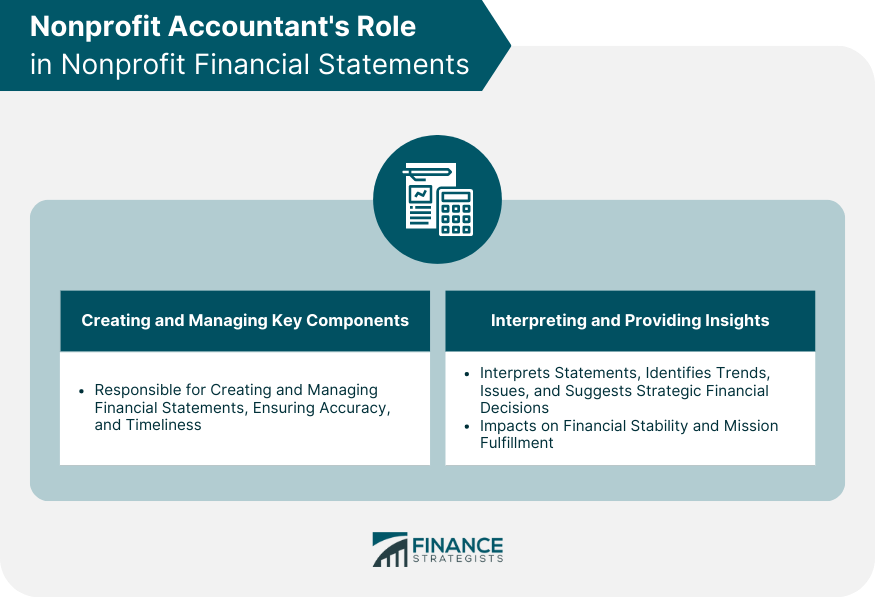A nonprofit accountant is a financial professional who specializes in the unique financial needs and constraints of nonprofit organizations. Their responsibilities extend beyond traditional accounting tasks. They are involved in strategic planning, budget development, financial statement preparation, and ensuring compliance with various regulatory bodies. In the nonprofit sector, these accountants play a pivotal role. Their work provides transparency to stakeholders and donors and ensures that the organization is using its resources effectively in achieving its mission. They help maintain trust with donors and the public while also aiding in the sustainable growth of the organization. Furthermore, nonprofit accountants often serve as financial advisors, guiding the organization on efficient fund allocation, managing financial risks, and developing future financial strategies. Becoming a nonprofit accountant usually requires at least a Bachelor's degree in accounting or a related field. Some organizations also prefer or require a Certified Public Accountant (CPA) designation. A few accountants choose to obtain a Certified Nonprofit Accounting Professional (CNAP) certification, which specifically targets the skills needed in the nonprofit sector. Beyond formal education and certifications, nonprofit accountants need a diverse skill set. They must be proficient in fund accounting, have a strong understanding of tax laws and regulations pertaining to nonprofits, and be adept at budgeting and financial analysis. Soft skills like communication, problem-solving abilities, and strong ethical standards are equally essential. The amount of experience required can vary. Many nonprofits prefer candidates with at least a few years of accounting experience, ideally within the nonprofit sector. However, entry-level positions do exist and allow professionals to gain the specialized experience required. Nonprofit accounting is distinctly different from its for-profit counterpart due to its focus on accountability rather than profitability. Nonprofits must track and report how funds are used, often segmented by donor-imposed restrictions. This is in contrast to for-profit organizations, which focus on revenues, costs, and overall profitability. Fund accounting is the backbone of nonprofit financial management. It involves segregating financial resources into categories based on restrictions and reporting each category as a separate "fund". This ensures money is appropriately tracked and spent in accordance with donor wishes and regulatory requirements. The nonprofit accountant has a central role in creating and managing the organization's financial statements. This includes the statement of financial position, the statement of activities, and the statement of cash flows. These statements provide a snapshot of the organization's financial health and operations, and it's the accountant's job to ensure they're accurate and up-to-date. Beyond creation, nonprofit accountants must interpret these financial statements and provide insights to the organization's leadership. This includes identifying trends, highlighting potential issues, and suggesting strategic financial decisions. Their analyses can greatly impact the organization's financial stability and its ability to fulfill its mission. A significant responsibility of the nonprofit accountant is creating the organization's budget. They work with other departments to estimate future income and expenditures and formulate a budget that aligns with the organization's goals. They also monitor actual results against the budget, analyzing variances and making recommendations for adjustments as necessary. Nonprofit accountants play a crucial role in long-term financial planning. They forecast future revenue streams, anticipate potential challenges, and strategize to ensure the organization's financial sustainability. They are essential in guiding the organization toward a financially stable future, ensuring its ability to continue serving its mission. Nonprofit accountants are central in managing funds raised from donors and grants. They ensure funds are correctly allocated and spent in line with donor expectations and grant requirements. They also provide clear and regular financial updates to donors and grantors, contributing to continued trust and support. Nonprofit accountants often collaborate with program staff to prepare grant applications, providing essential financial data. Once grants are received, they handle the financial reporting and compliance aspects, ensuring funds are used appropriately and reports are submitted on time. Audits are a routine part of nonprofit operations, whether internal or external. Nonprofit accountants take the lead in preparing for these audits, gathering the necessary documentation, and ensuring the organization's financial records are in order. Once audits are complete, nonprofit accountants are responsible for addressing any findings or recommendations. They might develop corrective action plans, make changes to financial processes, or adjust the way financial data is reported. Nonprofit organizations are subject to various laws and regulations at both the federal and state levels. These can include IRS regulations related to tax-exempt status, state laws governing charitable solicitations, and regulations tied to specific types of funding, like grants. Staying compliant with these laws is paramount to maintaining the organization's status and public trust. Nonprofit accountants are key players in maintaining regulatory compliance. They ensure that all financial transactions adhere to relevant laws and regulations. They also handle necessary reporting, including annual tax forms, grant reporting, and other filings. They play a crucial role in avoiding regulatory penalties and safeguarding the organization's reputation. One of the greatest challenges for nonprofit accountants is managing limited resources. Nonprofits must make the most of every dollar received, and accountants often need to get creative to stretch funds as far as possible while still complying with donor restrictions and regulatory requirements. Laws and regulations affecting nonprofits are constantly evolving. Nonprofit accountants must stay updated on these changes to ensure ongoing compliance. This requires continuous learning and adaptability. A nonprofit accountant, specializing in the unique financial needs of nonprofit organizations, plays a pivotal role in managing resources, ensuring compliance, and maintaining transparency. Their functions extend into strategic planning, budgeting, financial forecasting, auditing, and even fundraising. The role demands a diverse skill set, including proficiency in fund accounting, an understanding of tax laws specific to nonprofits, and effective communication abilities. Challenges in the field, such as managing limited resources and staying abreast of evolving regulations, are met with adaptability and continuous learning. Despite these challenges, nonprofit accountants are crucial in maintaining an organization's financial health and sustainability, thereby fortifying the trust of donors and stakeholders. As key participants in the financial mechanisms of the nonprofit sector, they are instrumental in advancing the mission of the organizations they serve.What Is a Nonprofit Accountant?
Education and Skills Required as a Nonprofit Accountant
Necessary Degrees and Certifications
Key Skill Sets
Experience Needed

Unique Aspects of Nonprofit Accounting
Differences Between Nonprofit and For-Profit Accounting
Overview of Fund Accounting
Nonprofit Accountant's Role in Nonprofit Financial Statements
Crafting and Managing Key Components of the Statements
Interpreting the Statements and Providing Insights

Nonprofit Accountant's Role in Budgeting and Forecasting
Budget Preparation and Analysis
Long-Term Financial Planning and Forecasting
Nonprofit Accountant’s Role in Fundraising and Grant Management
Managing Funds and Donor Expectations
Role in Grant Application and Reporting
Nonprofit Accountant’s Role in Audits
Preparing for Audits
Responding to Audit Findings
Regulatory Compliance and Nonprofit Accountants
Overview of Applicable Laws and Regulations
Role in Compliance and Reporting
Challenges Faced by Nonprofit Accountants
Managing Limited Resources
Keeping Up With Regulatory Changes
Final Thoughts
Nonprofit Accountant FAQs
A nonprofit accountant manages the finances of a nonprofit organization, ensuring compliance with laws, preparing financial statements, and aiding in strategic financial planning.
A bachelor's degree in accounting or a related field is typically required, along with knowledge of fund accounting and nonprofit regulations. A CPA or CNAP certification may also be beneficial.
Nonprofit accounting focuses on accountability over profitability. It uses fund accounting to track and report how funds are used based on restrictions, as opposed to focusing on profits.
Nonprofit accountants manage funds raised from donors and grants, ensure they are correctly allocated, provide financial updates, and assist in grant application and reporting.
Some challenges include managing limited resources, staying updated with regulatory changes, and ensuring the organization's financial sustainability while adhering to its mission.
True Tamplin is a published author, public speaker, CEO of UpDigital, and founder of Finance Strategists.
True is a Certified Educator in Personal Finance (CEPF®), author of The Handy Financial Ratios Guide, a member of the Society for Advancing Business Editing and Writing, contributes to his financial education site, Finance Strategists, and has spoken to various financial communities such as the CFA Institute, as well as university students like his Alma mater, Biola University, where he received a bachelor of science in business and data analytics.
To learn more about True, visit his personal website or view his author profiles on Amazon, Nasdaq and Forbes.















